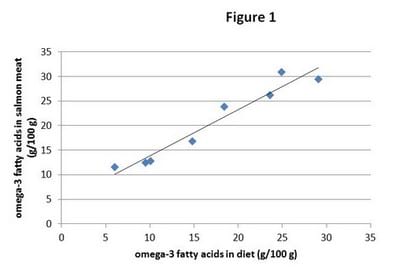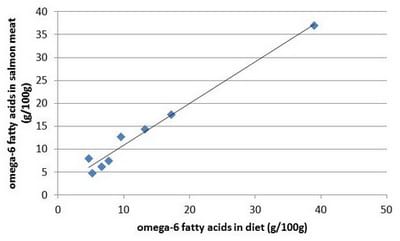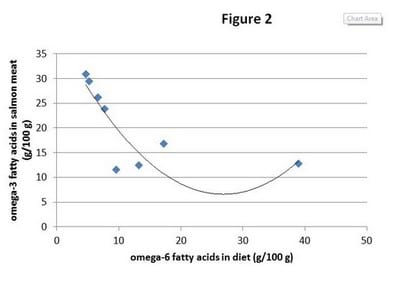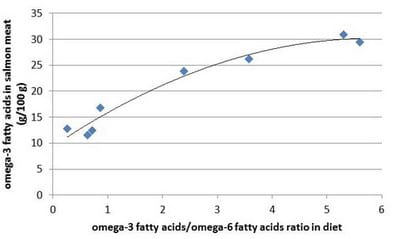Farmed Fish are what they eat...Sort of
Eating fish is becoming more popular, at least in part due to the health benefits derived from its consumption. In particular, a growing body of evidence suggests that it is the omega-3 fatty acids in fish meat that are responsible for these benefits.
It is, therefore, of interest to produce fish which are able to supply omega-3 fatty acids in their meat.
I examined data from two feeding studies (here and here) on farmed Atlantic salmon. The experimental diets were designed to provide vastly different levels of omega-3 and omega-6 fatty acids in the fish feed, and the effect of the dietary differences on fatty acid content of the salmon meat was determined.
It is worth noting that the total amount of fat in salmon meat was very similar within each study, regardless of the dietary changes, so the data presented here represent the compositional changes in fat. Also, the total amount of fat in the experimental diets was nearly equal within each study.
To a certain extent, the data indicated that farmed salmon are what they eat – see Figure 1.


Figure 1. The amount of omega-3 and omega-6 fatty acid levels in salmon feed strongly correlated to their respective levels in salmon meat.
Simply put, more omega-3 fatty acids fed to salmon resulted in more omega-3 fatty acids in salmon meat, and the same is true for omega-6 fatty acids.
Perhaps more interesting is the effect of omega-6 fatty acids in salmon feed on omega-3 fatty acids levels in meat – do increasing levels of omega-6 fatty acids in the diet affect omega-3 fatty acid levels in salmon meat?


Figure 2. The amount of omega-6 fatty acids, and the ratio of omega-3/omega-6 fatty acids, in salmon diets had limited effects on omega-3 fatty acids levels in salmon meat.
So, increased levels of omega-6 fatty acids in the diet certainly reduced omega-3 levels in salmon meat, but only to a certain degree. Another way to consider the data is the following:
- An 8.3-fold increase in omega-6 fatty acid levels in the salmon diet only lowered the omega-3 levels in the meat by 2.7-fold (see Figure 2, upper graph).
- A 21.6-fold change in the ratio of omega-3 to omega-6 fatty acids in the salmon feed changed omega-3 levels in the meat by 2.7-fold (see Figure 2, lower graph).
Salmon nutritionists, therefore, have leeway when formulating diets, and can take into account the costs of all available feed ingredients. In the two experiments I have used here, the diets were formulated to contain differing levels of fish, palm, soybean, canola, and olive oils, and differing amounts of fish meal, to achieve the variation in fatty acid content of the diets. Also, one study I used here looked at using minimal amounts of fish meal and oil in order to improve the sustainability of fish farming (the concept of “Fish in, Fish out”). As a result, salmon producers can find a balance between lowering feed costs and maintaining levels of healthy omega-3 fatty acids in salmon meat.
Hi Barry,
Thank you for your question. Omega-3 fatty acid levels in fish directly come from the types and amounts of fatty acids in fish feed. Fish meal, typical for fish diets because of the nutrient content and because it is highly palatable to fish, will usually contain notable levels of omega-3 fatty acids. However, the levels of omega-3 fatty acids will depend on what type of fish comprise the meal. So, testing is required. For fish oils, it's the same concept.
The veg oils also contain some omega-3 fatty acids, but not nearly as much as fish products. Please see the reference in the article above for more of this data.
The good news about all of this as described in the article - you can alter the diet based on ingredient price and still produce fish with healthy omega-3 fatty acids levels in meat.
Barry - please contact me further and we can discuss.
Sincerely,
Dave
dalbin@insta-pro.com
Hi Dave, Many thanks for your detailed reply, it was very helpful. My research has resulted in the production of Tilapia in full strength Atlantic seawater. Growth is slower and reproduction levels are lower than fresh water. However, we have commercial results. Now the remaining problem is the supply of suitable feed which is extremely expensive. I am currently experimenting with Duck Weed, using rabbit pellets as a binder and passing it through a meat grinder. The process produces a floating feed when dried. Duck weed is 46% crude protein. Is there Omega 3 Fatty Acid in Duck weed?
My story can be found here, "growing tilapia in atlantic seawater in st. kitts"
"You tube snapper conaree"
cheers!










